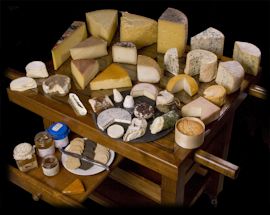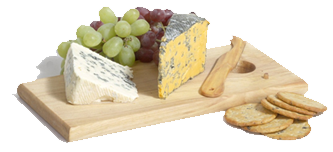
|
|
The first question one might ask is; what makes a cheese suitable or unsuitable for vegetarians? Cheeses can be made with any type of milk, and in the case of vegan substitutes, soya or rice milk, for example. This in itself is absolutely acceptable - whether vegetarian or vegan, there is an option for everyone. Problems can arise, however, once the actual processing of the milk commences. The Cheese Making Process Depending on the type of cheese being made, the process varies. The following simplified description (for making cheddar cheese) goes some way towards explaining the procedure. Raw milk is delivered to the dairy and pumped into giant aluminium vats, where it is heated to a temperature of around 30oC. Once heated, a acidic liquid is added to the milk called rennet. The rennet curdles the milk, separating the milk into solids (curds) and liquids (whey). The mix is heated more to encourage the further separating and setting of the solids (this is known as scalding). The two parts of the mixture must then be fully separated - only about 10% of the original quantity of milk remains as solids - the part that eventually ends up as cheese. Salt is added and mixed through to act as a stabiliser and preservative. The curds are then packed in cheesecloths and specific species of moulds are permitted to colonise the outside of the cloths around the blocks of cheese. After a maturation period, the large blocks are prepared for packaging and sale. Rennet The problem occurs once the rennet is added. Traditionally, rennet has been sourced from the stomach juices of animals - usually calves. More recently, a microbial alternative (suitable for vegetarians) has been more commonly used in cheese making, but this is by no means across the board. Rennet acts in much the same way as other acidic liquids such as vinegar or lemon juice. In fact, a cheese called ‘paneer’, used extensively in mid-eastern cookery and reasonably easy to make at home, is prepared using only milk and lemon juice. Some cheese types (such as cheddar or brie) can be found in both vegetarian and non-vegetarian forms. Other varieties are not so flexible - an example of a cheese type which is not suitable for vegetarian consumption is parmesan. However, a non-dairy substitute exists: Florentino Parmazano found in Health Food Shops. Labelling There is a distinct lack of vegetarian-related labelling on most foods, with products at the cheese counter being no exception. A good variety of cheeses on the market are indeed suitable for vegetarian consumption but there is often no way of knowing without going in search of answers - a slow business at the best of times. |
|
Main Menu |
|
|
|
|
|
|
20/12/2025 © Veggiefood

